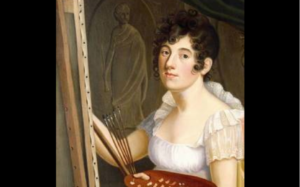Hippolytus' song
(Poet's title: Hippolits Lied)
Set by Schubert:
D 890
[July 1826]
Lasst mich, ob ich auch still verglüh,
Lasst mich nur stille gehn,
Sie seh ich spät, sie se ich früh
Und ewig vor mir stehn.
Was ladet ihr zur Ruh mich ein?
Sie nahm die Ruh mir fort;
Und wo sie ist, da muss ich sein,
Hier sei es oder dort.
Zürnt diesem armen Herzen nicht,
Es hat nur einen Fehl:
Treu muss es schlagen, bis es bricht,
Und hat des nimmer Hehl.
Lasst mich, ich denke doch nur sie,
In ihr nur denke ich;
Ja! ohne sie wär ich einst nie
Bei Engeln ewiglich.
Im Leben denn und auch im Tod,
Im Himmel, so wie hier,
Im Glück und in der Trennung Not
Gehör ich einzig ihr.
Leave me, even though I am quietly fading away,
Let me just go off in silence;
I see her late in the day, I see her early in the morning,
And she is always standing before me.
Why are you inviting me to rest?
She has taken rest away from me;
And where she is, that is where I have to be,
Whether here or there.
Do not make this poor heart angry,
It has only one fault:
It has to beat on faithfully until it breaks,
And it has never made a secret of the fact.
Leave me, for I can only think of her;
I can only think because of her;
Yes! Without her I could never one day be
Amongst the angels eternally.
So in life as in death,
In heaven as here,
In happiness and in the agony of separation
I belong only to her.
All translations into English that appear on this website, unless otherwise stated, are by Malcolm Wren. You are free to use them on condition that you acknowledge Malcolm Wren as the translator and schubertsong.uk as the source. Unless otherwise stated, the comments and essays that appear after the texts and translations are by Malcolm Wren and are © Copyright.
☙
Themes and images in this text:
The name ‘Hippolit’ evokes the character Hippolytus in Greek myth, the object of his step-mother Phaedra’s passion (the theme of tragedies by Euripides and Racine, amongst others). However, in the context of Johanna Schopenhauer’s Gabriele, Hippolit reciprocates the heroine’s love, even though they cannot be united since she is already married. It is a story about the power of renunciation and the value of being dutiful and upright. The poem appears at the point in the narrative when Gabriele persuades Hippolit not to kill himself because of his impossible love for her: that would be the cowardly, easy way out of the situation. The poem therefore expresses Hippolit’s acceptance of his fate and the value of renunciation.
The widowed Johanna Schopenhauer (mother of the future philosopher Arthur) was a neighbour of Goethe in Weimar at the time she was writing Gabriele. She was on good terms with him (having been the first person in Weimar to welcome Goethe’s wife, Christiane, into polite society), but had no illusions that she could produce publishable poetry in such exalted company. She therefore asked her lodger (‘Secret Archival Councillor Georg Friedrich Conrad Ludwig Müller von Gerstenbergk’) to supply the four poems (including Hippolits Lied) that appear in the novel.
"Gerstenbergk was a career-minded civil servant who, in order to gain standing in Weimar's aristocratic society, had added to his family name (Müller) the name of his ennobled uncle (von Gerstenbergk). He also dabbled in writing stories and poems and sought out philosophical conversations in which he revealed himself as a sensitive character. Though thirty-three years old, he still acted very much the young man: his gently wistful charm was successful with some women . . ." Rüdiger Safranski, Schopenhauer and the Wild Years of Philosophy English Translation by Ewald Osers. London 1989 p. 165
☙
Original Spelling Hippolits Lied Laßt mich, ob ich auch still verglüh', Laßt mich nur stille gehn; Sie seh' ich spät, Sie seh' ich früh Und ewig vor mir stehn. Was ladet ihr zur Ruh' mich ein? Sie nahm die Ruh' mir fort; Und wo Sie ist, da muß ich seyn, Hier sey es oder dort. Zürnt diesem armen Herzen nicht, Es hat nur e i n e n Fehl: Treu muß es schlagen bis es bricht, Und hat deß nimmer Hehl. Laßt mich, ich denke doch nur Sie; In Ihr nur denke ich; Ja! ohne Sie wär' ich einst nie Bei Engeln ewiglich. Im Leben denn und auch im Tod', Im Himmel, so wie hier, Im Glück und in der Trennung Noth Gehör' ich einzig Ihr.
Confirmed by Peter Rastl with Schubert’s probable source, Gabriele. Ein Roman von Johanna Schopenhauer. In drei Theilen. Dritter Theil. Leipzig: F. A. Brockhaus. 1821, page 146.
Note: Johanna Schopenhauer wrote in the foreword of her novel (Gabriele. Erster Theil. Leipzig: 1819, Vorwort, page VIII) that the poems in her book are not by herself, but were supplied by Friedrich von Gerstenbergk. Nevertheless, the poem is often misattributed to Johanna Schopenhauer.
To see an early edition of the text, go to https://play.google.com/books/reader?id=S6xOAAAAcAAJ&hl=en&pg=GBS.PA146


